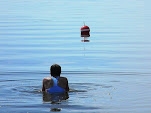Obesity Rates May Be Worse Than We Think
Hopefully, you are aware of what BMI is. If not, here's a link to explain it and calculate your own. By the current standards, less than 18 is underweight, 18-25 is normal weight, 25-30 is overweight and over 30 is obese.
The article summarizes research done that shows BMI can indicate people are overweight when body fat tests would show they are obese. Those people who are not diagnosed as obese would be missing out on information about risks and complications of obesity since they aren't being diagnosed.
The research authors suggest lowering the obesity threshold from 30 to 28 for men and 24 for women.
Crap. If that is adopted, that means I just went from borderline "overweight" to actually "obese". You read that right.
I'm 5'4" and weight between 142 and 144 on any given day. Based on those numbers, my BMI is 24. According to BMI standards, I am just barely a healthy weight and under the new standards, I would be obese.
What BMI misses is that I'm a triathlete and lifetime athlete. My pant size is 4/6. For those of you who know me, I am not a slender build, I prefer to call it "farmer build". My blood pressure and cholesterol are on the low end of healthy and my body fat percent is consistently less than 18%. The last time I had it measured by a professional, it was +/- 15%. For reference, here is a body fat percentage chart that shows the ranges for men and women, and for age groups.
 |
| Graph came from www.wellsphere.com |
My body fat classifies me as very lean, whether you want to use the 15% during peak training or 18% for off-season. I had my body fat tested because I was having a hard time losing weight until I realized that I shouldn't be losing weight; much below 15% and then other health risks start.
So what's the big deal, I'm healthy, right?
The big deal is that some insurance companies use BMI to determine your risk factors for insurance coverage. I can only imagine what the red tape would be like trying to prove I am not obese when a number from an equation indicates that clearly, I am obese. The math just doesn't work out.
But isn't there a bigger picture here? If BMI is missing a large section of obese people, and also mis-diagnoses us "bodybuilder" types, then is it really a good gauge to be using at all? Body fat testing is fast and easy, and with a few simple tools you can even do it yourself. Body fat is always a reliable index when it comes to determining a person's healthy weight. Why aren't we using that as the standard? Maybe my primary care doc doesn't know how or have the time, but it is $5 to have it done at a personal trainers office. I'll gladly pay that out of my own pocket and avoid being labeled overweight or obese.
(FYI, if you're interested in doing your own body fat testing, let me know and I can do another post about what John and I use. We are consistently able to get within 2% of what a professional would get)



